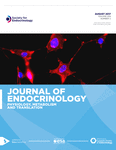20 YEARS OF LEPTIN: Role of leptin in energy homeostasis in humans
- Division of Molecular Genetics, Departments of Pediatrics and Medicine, College of Physicians and Surgeons, Columbia University, Russ Berrie Medical Science Pavilion, 6th Floor, 1150 St Nicholas Avenue, New York, New York 10032, USA
- Correspondence should be addressed to M Rosenbaum; Email: mr475{at}columbia.edu
Abstract
The hyperphagia, low sympathetic nervous system tone, and decreased circulating concentrations of bioactive thyroid hormones that are common to states of congenital leptin deficiency and hypoleptinemia following and during weight loss suggest that the major physiological function of leptin is to signal states of negative energy balance and decreased energy stores. In weight-reduced humans, these phenotypes together with pronounced hypometabolism and increased parasympathetic nervous system tone create the optimal circumstance for weight regain. Based on the weight loss induced by leptin administration in states of leptin deficiency (obese) and observed similarity of phenotypes in states of congenital and dietary-induced states of hypoleptinemia (reduced obese), it has been suggested that exogenous leptin could potentially be useful in initiating, promoting, and sustaining weight reduction. However, the responses of human beings to exogenous leptin administration are dependent not only on extant energy stores but also on energy balance. Leptin administration to humans at usual weight has little, if any, effect on body weight while leptin administration during weight loss mitigates hunger, especially if given in supraphysiological doses during severe caloric restriction. Leptin repletion is most effective following weight loss by dietary restriction. In this state of weight stability but reduced energy stores, leptin at least partially reverses many of the metabolic, autonomic, neuroendocrine, and behavioral adaptations that favor weight regain. The major physiological function of leptin is to signal states of negative energy balance and decreased energy stores. Leptin, and pharmacotherapies affecting leptin signaling pathways, is likely to be most useful in sustaining weight loss.
- Received in final form 17 July 2014
- Accepted 24 July 2014
- Made available online as an Accepted Preprint 25 July 2014
- © 2014 Society for Endocrinology











